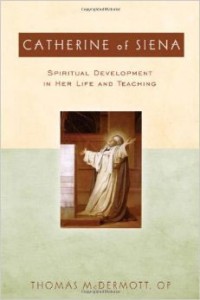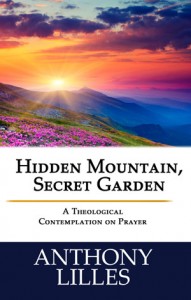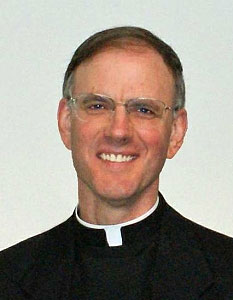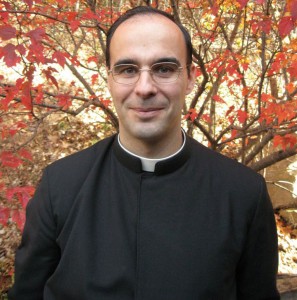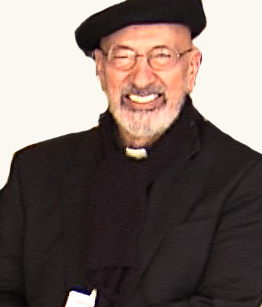Dr. Matthew Bunson discusses the life, times and teachings of St. Isidore of Seville
Born: c. 560 Cartagena, Spain
From Vatican.va, an excerpt from the teachings ofPope Benedict XVI General Audience 2008
To understand Isidore better it is first of all necessary to recall the complexity of the political situations in his time to which I have already referred: during the years of his boyhood he was obliged to experience the bitterness of exile. He was nevertheless pervaded with apostolic enthusiasm. He experienced the rapture of contributing to the formation of a people that was at last rediscovering its unity, both political and religious, with the providential conversion of Hermenegild, the heir to the Visigoth throne, from Arianism to the Catholic faith. Yet we must not underestimate the enormous difficulty of coming to grips with such very serious problems as were the relations with heretics and with the Jews. There was a whole series of problems which appear very concrete to us today too, especially if we consider what is happening in certain regions in which we seem almost to be witnessing the recurrence of situations very similar to those that existed on the Iberian Peninsular in that sixth century. The wealth of cultural knowledge that Isidore had assimilated enabled him to constantly compare the Christian newness with the Greco-Roman cultural heritage, however, rather than the precious gift of synthesis it would seem that he possessed the gift of collatio, that is, of collecting, which he expressed in an extraordinary personal erudition, although it was not always ordered as might have been desired.
In any case, his nagging worry not to overlook anything that human experience had produced in the history of his homeland and of the whole world is admirable. Isidore did not want to lose anything that man had acquired in the epochs of antiquity, regardless of whether they had been pagan, Jewish or Christian. Hence, it should not come as a surprise if, in pursuing this goal, he did not always manage to filter the knowledge he possessed sufficiently in the purifying waters of the Christian faith as he would have wished. The point is, however, that in Isidore’s intentions, the proposals he made were always in tune with the Catholic faith which he staunchly upheld. In the discussion of the various theological problems, he showed that he perceived their complexity and often astutely suggested solutions that summarize and express the complete Christian truth. This has enabled believers through the ages and to our times to profit with gratitude from his definitions. A significant example of this is offered by Isidore’s teaching on the relations between active and contemplative life. He wrote: “Those who seek to attain repose in contemplation must first train in the stadium of active life; and then, free from the dross of sin, they will be able to display that pure heart which alone makes the vision of God possible” (Differentiarum Lib. II, 34, 133: PL 83, col 91A). Nonetheless, the realism of a true pastor convinced him of the risk the faithful run of reducing themselves to one dimension. He therefore added: “The middle way, consisting of both of these forms of life, normally turns out to be more useful in resolving those tensions which are often aggravated by the choice of a single way of life and are instead better tempered by an alternation of the two forms” (op. cit. 134; ibid., col 91B).
Isidore sought in Christ’s example the definitive confirmation of a just orientation of life and said: “The Saviour Jesus offers us the example of active life when during the day he devoted himself to working signs and miracles in the town, but he showed the contemplative life when he withdrew to the mountain and spent the night in prayer” (op. cit. 134: ibid.). In the light of this example of the divine Teacher, Isidore can conclude with this precise moral teaching: “Therefore let the servant of God, imitating Christ, dedicate himself to contemplation without denying himself active life. Behaving otherwise would not be right. Indeed, just as we must love God in contemplation, so we must love our neighbour with action. It is therefore impossible to live without the presence of both the one and the other form of life, nor can we live without experiencing both the one and the other” (op. cit., 135; ibid. col 91C). I consider that this is the synthesis of a life that seeks contemplation of God, dialogue with God in prayer and in the reading of Sacred Scripture, as well as action at the service of the human community and of our neighbour. This synthesis is the lesson that the great Bishop of Seville has bequeathed to us, Christians of today, called to witness to Christ at the beginning of a new millennium.
For more visit Vatican.va
Dr. Matthew Bunson, Senior Fellow of the St. Paul Center for Biblical Theology, is one of the United States’ leading authorities on the papacy and the Church.
His books include: The Encyclopedia of Catholic History; The Encyclopedia of Saints; Papal Wisdom; All Shall Be Well; Encyclopedia of the Roman Empire; and The Angelic Doctor: The Life and World of St. Thomas Aquinas; The Pope Encyclopedia; We Have a Pope! Benedict XVI, the first Catholic biography of the Holy Father in the English language; the Encyclopedia of U.S. Catholic History; Pope Francis. His also the editor of OSV’s “The Catholic Answer” magazine.
Tags: matthew bunson, St. Isidore of Seville
This entry was posted on Wednesday, February 26th, 2014 at 5:51 pm
You can follow any responses to this entry through the RSS 2.0 feed.
Episode 11- The Four Marks of the Church
[powerpress]
Archbishop Lucas offers insights on the US Catholic Catechism for Adults Chapter 11:
“In the earliest professions of faith, the Catholic Church identified herself as “one, holy, catholic, and apostolic.”  We find these words in the Nicene Creed professed at Sunday Mass.  Traditionally, they refer to what are known as the four marks of the Church, traits that identify the Church before the world.”
The Most Reverend George J. Lucas leads the Archdiocese of Omaha.
For other episodes in the visit our Archbishop George Lucas page
This programs is based on:
More information can be found here.
We wish to thank the USCCB for the permissions granted for use of relevant material used in this series.
Also we wish to thank Omar Gutierrez and Teresa Monaghen for their vocal talents in this episode.
Tags: Archbishop George Lucas Episode 11, Catholic Catechism, The Four Marks of the Church
This entry was posted on Wednesday, February 26th, 2014 at 4:13 pm
You can follow any responses to this entry through the RSS 2.0 feed.
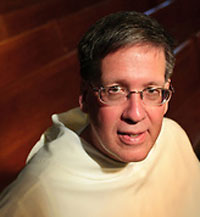 Episode 4 St. Catherine of Siena: Her Life and Teachings with Fr. Thomas McDermott-
Episode 4 St. Catherine of Siena: Her Life and Teachings with Fr. Thomas McDermott-
[powerpress]
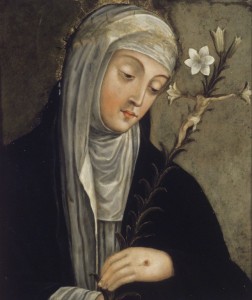 In this episode, Fr. McDermott discusses the experience of St. Catherine’s intervention in the events in Avignon, France and her influence with the Pope.
In this episode, Fr. McDermott discusses the experience of St. Catherine’s intervention in the events in Avignon, France and her influence with the Pope.
Fr. McDermott speaks of her time in Rome and the events surrounding her death. And we lay the groundwork for our future episodes which we discuss specific aspects of St. Catherine’s teachings.
Fr. Thomas McDermott, OP is Regent of Studies for the Dominican Province of St. Albert the Great and is the author of “Catherine of Siena: Spiritual Development in Her Life and Teaching” (Paulist, 2008) and “Filled with all the Fullness of God: An Introduction to Catholic Spirituality”. He obtained a doctorate in spiritual theology from the Angelicum and taught for several years at Kenrick-Glennon Seminary in St. Louis. He crrently serves as pastor at St. Vincent Ferrer, in Chicago, IL.
- The statue mentioned in the discussion found in Rome
- The bust of St. Catherine of Siena spoken of by Fr. McDermott
- The Vanni portrait of St. Catherine
Tags: catherine of siena, st catherine of siena, Thomas McDermott
This entry was posted on Wednesday, February 26th, 2014 at 3:13 pm
You can follow any responses to this entry through the RSS 2.0 feed.
Is Jesus Calling? A Spiritual Guide to Discerning Your Vocational Call with Fr. Paul Hoesing – episode 5: 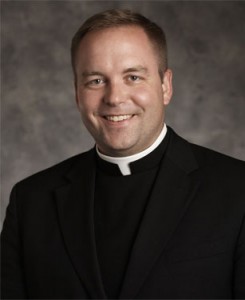
The Sixth Spiritual Lesson: Your fear is from the spirit against Christ. “God does not reveal himself through fear, pressure or confusion. This where the spirit against Christ reveals himself.”
Questions: What are your ideas and images of god the Father and how do they differ from what Jesus teaches us about the Father? Do you see the Father as someone who pressures you to do things? Where does fear drive your relationship with the Father? Recall your latest experience of peace, stillness, clarity and gratitude in God and believe that that is how the Father draws you?
[powerpress]
The Seventh Spiritual Lesson: God’s will is found in your will when you are in Christ. “God’s will, His desire for you, is not out there somwhere! It is found in your own desire when you are in Christ! That is the will of God for you!”
Questions: Does the thought of the priesthood come into your thoughts, feelings and desires when you are experiencing the peaceful presence of God?
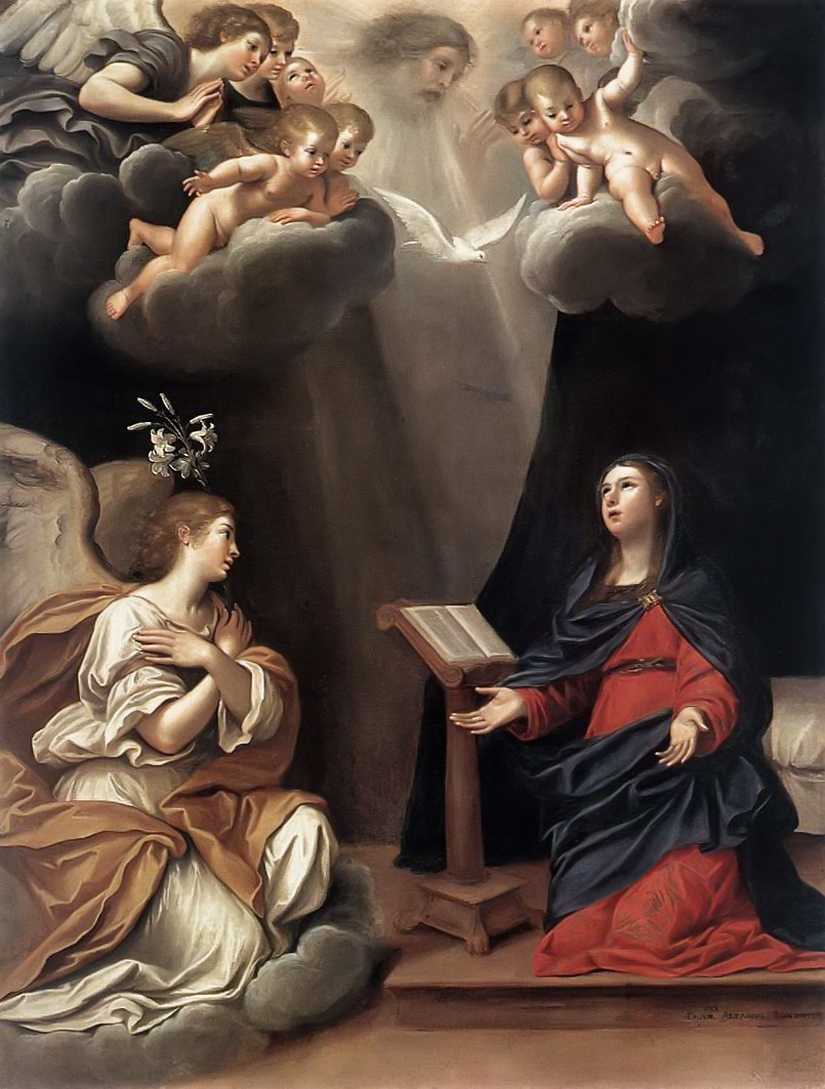 Based on “Is Jesus Calling You To Be A Catholic Priest: A helpful guide”, published by National Conference of Diocesan Vocation Director.
Based on “Is Jesus Calling You To Be A Catholic Priest: A helpful guide”, published by National Conference of Diocesan Vocation Director.
Fr. Paul Hoesing serves as the Vocation Director for the Archdiocese of Omaha, NE.
Check out “For Your Vocation.org“
Tags: Paul Hoesing, Spiritual Lesson
This entry was posted on Wednesday, February 26th, 2014 at 11:18 am
You can follow any responses to this entry through the RSS 2.0 feed.
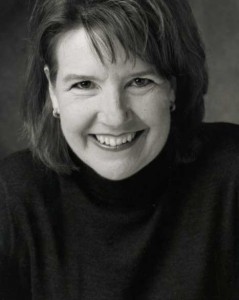 Episode 12- Seeking Truth with Sharon Doran -Announcement of the Kingdom Of God (PART 2) [powerpress]
Episode 12- Seeking Truth with Sharon Doran -Announcement of the Kingdom Of God (PART 2) [powerpress]
Episode 12 –
Announcement of the Kingdom Of God (part 2)
“Repent, for the Kingdom of God is at hand.â€
With these words, Jesus proclaimed the coming of God’s Kingdom.
People have always clamored for a King and Israel had good and bad Kings throughout her history. But Jesus Christ is the true King, the eternal King, the KING of KINGS and Lord of Lords.
Through his bride the Church, his kingdom reigns on earth and in heaven.
As partakers of the sacraments, we return to the divine nature God initially intended.
Sharon Doran serves as the teaching director of “Seeking Truth.†An experienced Bible Study teacher, Sharon has a passion for scripture that will motivate and challenge you to immerse yourself in God’s Word and apply His message to your every day life.
 “Seeking Truth†is an in depth Catholic Bible Study, commissioned by the Archdiocese of Omaha in response to John Paul II’s call to the New Evangelization as well as Pope Benedict XVI’s exhortation for all Catholics to study scripture. To learn more go to:www.seekingtruth.net
“Seeking Truth†is an in depth Catholic Bible Study, commissioned by the Archdiocese of Omaha in response to John Paul II’s call to the New Evangelization as well as Pope Benedict XVI’s exhortation for all Catholics to study scripture. To learn more go to:www.seekingtruth.net
Tags: kingdom of god, Sharon Doran
This entry was posted on Wednesday, February 26th, 2014 at 9:38 am
You can follow any responses to this entry through the RSS 2.0 feed.
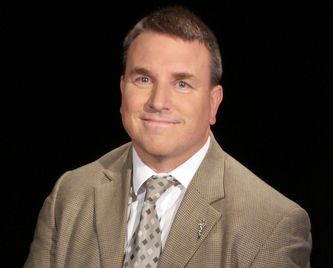 Episode 21 – Great Works in Western Literature with Joseph Pearce – T.S. Eliot and “The Waste Land”
Episode 21 – Great Works in Western Literature with Joseph Pearce – T.S. Eliot and “The Waste Land”
(Of special note: excerpts from “The Waste Land” are read by T. S. Eliot)
[powerpress]
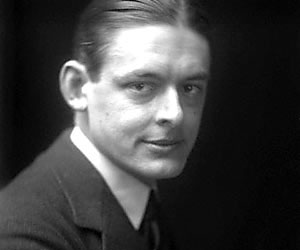 “Eliot’s place as a poet of the highest stature is assured. The Waste Land is the quintessential debunking of modernity and is also, simultaneously, a potent antidote to the poison of postmodernism..”
“Eliot’s place as a poet of the highest stature is assured. The Waste Land is the quintessential debunking of modernity and is also, simultaneously, a potent antidote to the poison of postmodernism..”
–Joseph Pearce -from Nov. 22, 2010 St. Austin Review —
You can find the complete poem here
An excerpt from “The Waste Land” by T. S. Eliot
If there were water
And no rock
If there were rock
And also water
And water
A spring
A pool among the rock
If there were the sound of water only
Not the cicada
And dry grass singing
But sound of water over a rock
Where the hermit-thrush sings in the pine trees
Drip drop drip drop drop drop drop
But there is no waterWho is the third who walks always beside you?
When I count, there are only you and I together
But when I look ahead up the white road
There is always another one walking beside you
Gliding wrapt in a brown mantle, hooded
I do not know whether a man or a woman
—But who is that on the other side of you?
Joseph Pearce is currently the Writer-in-Residence and Visiting Fellow at Thomas More College of Liberal Arts in Merrimack, New Hampshire. He is also Visiting Scholar at Mount Royal Academy in Sunapee, New Hampshire. He is also Visiting Scholar at Mount Royal Academy in Sunapee, New Hampshire. He is co-editor of the Saint Austin Review (or StAR), an international review of Christian culture, literature, and ideas published in England (Family Publications) and the United States (Sapientia Press). He is also the author of many books, including literary biographies of Solzhenitsyn, J. R. R. Tolkien, C. S. Lewis, G. K. Chesterton, and Oscar Wilde.
Tags: joseph pearce, Western Literature
This entry was posted on Tuesday, February 25th, 2014 at 1:59 pm
You can follow any responses to this entry through the RSS 2.0 feed.
Episode 5 -The Way of Mystery: The Eucharist and Moral Living 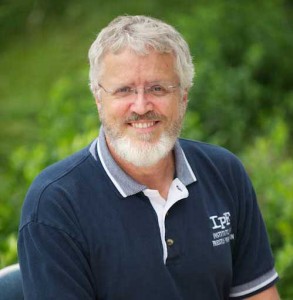
The penitential rite of the mass, while not the pivotal point, it is one of the most important points of the mass, and key in our moral conversion…it’s about the crucifixion to sin, meeting evil with love.
[powerpress]
For more episodes in “The Way of Mystery” Series click here
Deacon James Keating, PhD, the director of Theological Formation for the Institute for Priestly Formation, located at Creighton University, in Omaha, is making available to â€Discerning Hearts†and all who listen, his series of programs entitled “The Way of Mysteryâ€.
 The Vatican II documents remind us that the spiritual journey is not made in a vacuum, that God has chosen to save us, not individually, but as The People of God. The Eucharist must help Christians to make their choices by discerning out of Christ’s paschal mystery. For this process to take place, however, Christians must first understand how the Eucharist puts them in touch with Christ’s passion, death, and resurrection, and what concrete implications being in touch with this mystery has for their daily lives.
The Vatican II documents remind us that the spiritual journey is not made in a vacuum, that God has chosen to save us, not individually, but as The People of God. The Eucharist must help Christians to make their choices by discerning out of Christ’s paschal mystery. For this process to take place, however, Christians must first understand how the Eucharist puts them in touch with Christ’s passion, death, and resurrection, and what concrete implications being in touch with this mystery has for their daily lives.
For more information on the “Institute of Priestly Formation†and for other material available by Deacon Keating, just click here
Don’t forget to pickup a copy of “Communion with Christ†, it is one of the best audio sets on prayer…ever!
Check out Deacon Keating’s “Discerning Heart†page
Tags: Deacon Keating, institute for priestly formation, james keating, the eucharist, theological formation
This entry was posted on Tuesday, February 25th, 2014 at 1:16 pm
You can follow any responses to this entry through the RSS 2.0 feed.
BTP#35 – Identifying and Battling the “Irrational Spirits” – The Mystery of Faith in the Wisdom of the Saints.
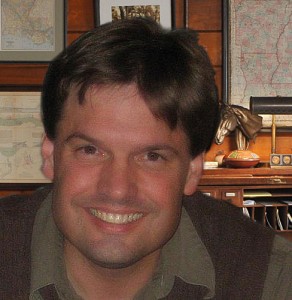
[powerpress]
In this episode Dr. Lilles discusses the nature of prayer. The use of “methods” or “techniques” is cautioned by Dr. Lilles. The relationship with the person of Jesus Christ is paramount. He discusses the struggles in prayer and the real “enemies” which assault us in prayer. He points to the experience and teachings of St. Anthony of the Desert, who battled the irrational spirits opposed to our relationship with God. Dr. Lilles then relates that teaching to the places of “death” which confront our lives today, the importance of naming the irrational “spirit” and using the “Word of Truth” to fight the battle.
Dr.Anthony Lilles is a Catholic husband and father of three teaching Spiritual Theology at St. John Vianney Theological Seminary. He teaches spiritual theology and spiritual direction to transitional deacons, and the spiritual classics to the men who enter the Spirituality Year, a year of prayer in preparation for seminary formation. He is the author of the “Beginning to Pray” Catholic blog spot.
For other episodes in the series visit the Discerning Hearts page for Dr. Anthony Lilles
Tags: catholic, catholic podcast, catholic prayer
This entry was posted on Monday, February 24th, 2014 at 12:48 pm
You can follow any responses to this entry through the RSS 2.0 feed.
Let him who is consoled see to humbling himself and lowering himself as much as he can, thinking how little he is able for in the time of desolation without such grace or consolation. On the contrary, let him who is in desolation think that he can do much with the grace sufficient to resist all his enemies, taking strength in his Creator and Lord.
[powerpress]
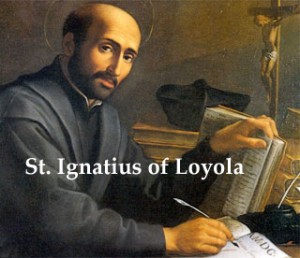 The Discernment of Spirits: Setting the Captives Free – Serves as an introduction to the Spiritual Exercises of St. Ignatius of Loyola
The Discernment of Spirits: Setting the Captives Free – Serves as an introduction to the Spiritual Exercises of St. Ignatius of Loyola
The 14 Rules for Discerning Spirits –
“The Different Movements Which Are Caused In The Soul”
as outlined by St. Ignatius of Loyola can be found here
Father Timothy M. Gallagher, O.M.V., was ordained in 1979 as a member of the Oblates of the Virgin Mary, a religious community dedicated to retreats and spiritual formation according to the Spiritual Exercises of St. Ignatius. Fr. Gallagher is featured on the EWTN series “Living the Discerning Life: The Spiritual Teachings of St. Ignatius of Loyola”.
For more information on how to obtain copies of Fr. Gallaghers’s various books and audio which are available for purchase, please visit his website: www.frtimothygallagher.org
For the other episodes in this series visit
Fr. Timothy Gallagher’s “Discerning Hearts†page
Tags: discernment of spirits, Father Timothy M. Gallagher, Timothy Gallagher
This entry was posted on Monday, February 24th, 2014 at 11:01 am
You can follow any responses to this entry through the RSS 2.0 feed.
FG#13 – The Way of Trust and Love Ep 2 – Fountains of Grace: reflections on contemporary spiritual classics with Donna Garrett
Join host Donna Garrett, with Fr. James Perez, LC, as they discuss the spiritual classic “The Way of Trust and Love: A Retreat Guided By St. Therese of Lisieux” by Fr. Jacques Philippe.
[powerpress]
Discussed in this episode, among other topics, from “The Way of Trust and Love”
The fact that we can’t save ourselves is something we acknowledge in words, but in fact we find it very hard to accept. We’d all like to be saved by our own efforts, to be strong and robust, to boast about our successes, to shine in other people’s eyes, even on the spiritual level. Worldly people want to be highly regarded because they have luxurious cars, expensive watches, designer clothes, professional prestige, and go around with beautiful people. As good Christians, we may want to stand out for our virtues, charisms, experience, and sound judgment. Then we consider that we are on the right path. But in fact we’re in danger of ending up with exactly the same mindset as the worldly people described above. Very often, without realizing it, we have a worldly outlook on the spiritual life: self-fulfillment, self-affirmation, expansion of ego, etc. And spiritual pride, we must be aware, is sometimes more destructive than social, worldly pride.
We cannot be saved by what we do; we can only be saved by grace, when God’s freely given love comes, takes hold of us, and transforms us, sometimes gently and progressively, but sometimes in a spectacular way. In general, the transformation is fairly slow and progressive, without our always being able to notice the action of grace.
Philippe, Jacques (2012-06-07). The Way of Trust and Love – A Retreat Guided by St. Therese of Lisieux (Kindle Locations 445-454). Scepter Publishers. Kindle Edition.
For other episodes in the this series click here “Fountains of Grace w/Donna Garrett“
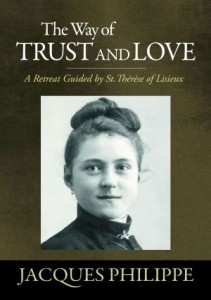
You can find “The Way of Trust and Love” here
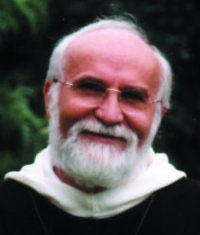
Fr. Jacques Philippe
Tags: catholic, catholic podcast, catholic prayer
This entry was posted on Monday, February 24th, 2014 at 3:51 am
You can follow any responses to this entry through the RSS 2.0 feed.
Gospel MT 5:38-48
Jesus said to his disciples:
“You have heard that it was said,
An eye for an eye and a tooth for a tooth.
But I say to you, offer no resistance to one who is evil.
When someone strikes you on your right cheek,
turn the other one as well.
If anyone wants to go to law with you over your tunic,
hand over your cloak as well.
Should anyone press you into service for one mile,
go for two miles.
Give to the one who asks of you,
and do not turn your back on one who wants to borrow.
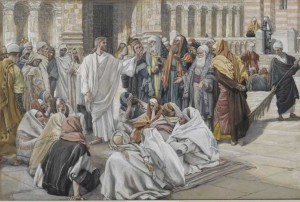 “You have heard that it was said,
“You have heard that it was said,
You shall love your neighbor and hate your enemy.
But I say to you, love your enemies
and pray for those who persecute you,
that you may be children of your heavenly Father,
for he makes his sun rise on the bad and the good,
and causes rain to fall on the just and the unjust.
For if you love those who love you, what recompense will you have?
Do not the tax collectors do the same?
And if you greet your brothers only,
what is unusual about that?
Do not the pagans do the same?
So be perfect, just as your heavenly Father is perfect.â€
Lectionary for Mass for Use in the Dioceses of the United States, second typical edition, Copyright © 2001, 1998, 1997, 1986, 1970 Confraternity of Christian Doctrine;
Tags: catholic, catholic podcast, catholic prayer
This entry was posted on Monday, February 24th, 2014 at 1:19 am
You can follow any responses to this entry through the RSS 2.0 feed.
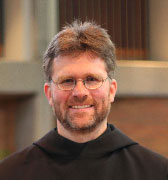 Episode 19 – The Holy Rule of St. Benedict: A Spiritual Path for Today’s World with Fr. Mauritius Wilde O.S.B., PhD.
Episode 19 – The Holy Rule of St. Benedict: A Spiritual Path for Today’s World with Fr. Mauritius Wilde O.S.B., PhD.
[powerpress]
In this episode, Fr. Maurtius is joined by his fellow Missionary Benedictines,  Sr. Fidelis Marie Lanowich 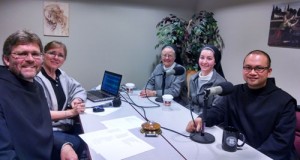 and Sr. Gabriel Mary Oestreich of the Immaculata Monastery, Norfolk, NE and Br. Damian Cayetano of Christ the King Priory, Schuyler, NE.  The group  discusses what drew them to the Holy Rule of St. Benedict.  They share their discernment process concerning their vocational call, the response of family and friends.  They discuss the experience of finding “home” within the life of their communities.
and Sr. Gabriel Mary Oestreich of the Immaculata Monastery, Norfolk, NE and Br. Damian Cayetano of Christ the King Priory, Schuyler, NE.  The group  discusses what drew them to the Holy Rule of St. Benedict.  They share their discernment process concerning their vocational call, the response of family and friends.  They discuss the experience of finding “home” within the life of their communities.
Father Mauritius Wilde, OSB, Ph.D., did his philosophical, theological and doctoral studies in Europe. He is the author of several books and directs retreats regularly. He serves as Prior of our monastery in Schuyler.
 For more information about the ministry of the the Missionary Benedictines of Christ the King Priory in Schuyler, Nebraska visit here:
For more information about the ministry of the the Missionary Benedictines of Christ the King Priory in Schuyler, Nebraska visit here:
Tags: Holy Rule of St. Benedict, Missionary Benedictines
This entry was posted on Thursday, February 20th, 2014 at 2:17 pm
You can follow any responses to this entry through the RSS 2.0 feed.
Dr. Matthew Bunson discusses the life, times and teachings of St. Gregory the Great part 2
Born: 540 AD, Rome, Italy
Gregory the Great, Pope (c. 540-604)
-Â Pastoral Rule
-Â Register of Letters
From Vatican.va, an excerpt from the teachings ofPope Benedict XVI General Audience 2008
In the theological plan that Gregory develops regarding his works, the past, present and future are compared. What counted for him more than anything was the entire arch of salvation history, that continues to unfold in the obscure meanderings of time. In this perspective it is significant that he inserted the news of the conversion of the Angles in the middle of his Book of Morals, a commentary on Job: to his eyes the event constituted a furthering of the Kingdom of God which the Scripture treats. Therefore, it could rightly be mentioned in the commentary on a holy book. According to him the leaders of Christian communities must commit themselves to reread events in the light of the Word of God: in this sense the great Pontiff felt he had the duty to orient pastors and the faithful on the spiritual itinerary of an enlightened and correct lectio divina, placed in the context of one’s own life.
Before concluding it is necessary to say a word on the relationship that Pope Gregory nurtured with the Patriarchs of Antioch, of Alexandria and of Constantinople itself. He always concerned himself with recognizing and respecting rights, protecting them from every interference that would limit legitimate autonomy. Still, if St Gregory, in the context of the historical situation, was opposed to the title “ecumenical” on the part of the Patriarch of Constantinople, it was not to limit or negate this legitimate authority but rather because he was concerned about the fraternal unity of the universal Church. Above all he was profoundly convinced that humility should be the fundamental virtue for every Bishop, even more so for the Patriarch. Gregory remained a simple monk in his heart and therefore was decisively contrary to great titles. He wanted to be – and this is his expression –servus servorum Dei. Coined by him, this phrase was not just a pious formula on his lips but a true manifestation of his way of living and acting. He was intimately struck by the humility of God, who in Christ made himself our servant. He washed and washes our dirty feet. Therefore, he was convinced that a Bishop, above all, should imitate this humility of God and follow Christ in this way. His desire was to live truly as a monk, in permanent contact with the Word of God, but for love of God he knew how to make himself the servant of all in a time full of tribulation and suffering. He knew how to make himself the “servant of the servants”. Precisely because he was this, he is great and also shows us the measure of true greatness.
For more visit Vatican.va
Dr. Matthew Bunson, Senior Fellow of the St. Paul Center for Biblical Theology, is one of the United States’ leading authorities on the papacy and the Church.
His books include: The Encyclopedia of Catholic History; The Encyclopedia of Saints; Papal Wisdom; All Shall Be Well; Encyclopedia of the Roman Empire; and The Angelic Doctor: The Life and World of St. Thomas Aquinas; The Pope Encyclopedia; We Have a Pope! Benedict XVI, the first Catholic biography of the Holy Father in the English language; the Encyclopedia of U.S. Catholic History; Pope Francis. His also the editor of OSV’s “The Catholic Answer” magazine.
Tags: matthew bunson, the Doctors of the Church
This entry was posted on Thursday, February 20th, 2014 at 12:40 pm
You can follow any responses to this entry through the RSS 2.0 feed.
It was with great joy we had the opportunity to talk with Fr. Thomas Dubay.  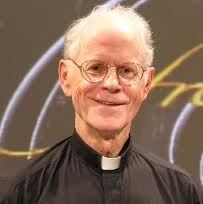   His work on “Fire Within” and all the programs he gave us on EWTN were instrumental in my spiritual growth. In those early days, he was like having a distant spiritual director who guided me, as well as the rest of us, toward a deeper relationship with Christ.
  His work on “Fire Within” and all the programs he gave us on EWTN were instrumental in my spiritual growth. In those early days, he was like having a distant spiritual director who guided me, as well as the rest of us, toward a deeper relationship with Christ.
[powerpress]
He told me once, “Kris, the best theology books are the lives of the saints; you study them and you won’t be led astray.”  Fr. Thomas Dubay, in a very real way, helped inspire the work of this blog and it’s mission.
Here’s a host of books by Fr. Thomas Dubay
Tags: catholic, catholic podcast, catholic prayer
This entry was posted on Thursday, February 20th, 2014 at 8:58 am
You can follow any responses to this entry through the RSS 2.0 feed.
Episode 4 -The Way of Mystery: The Eucharist and Moral Living 
Prayer and our active participation in the Mass: the introductory rite and the Liturgy of the Word
[powerpress]
For more episodes in “The Way of Mystery” Series click here
Deacon James Keating, PhD, the director of Theological Formation for the Institute for Priestly Formation, located at Creighton University, in Omaha, is making available to â€Discerning Hearts†and all who listen, his series of programs entitled “The Way of Mysteryâ€.
 The Vatican II documents remind us that the spiritual journey is not made in a vacuum, that God has chosen to save us, not individually, but as The People of God. The Eucharist must help Christians to make their choices by discerning out of Christ’s paschal mystery. For this process to take place, however, Christians must first understand how the Eucharist puts them in touch with Christ’s passion, death, and resurrection, and what concrete implications being in touch with this mystery has for their daily lives.
The Vatican II documents remind us that the spiritual journey is not made in a vacuum, that God has chosen to save us, not individually, but as The People of God. The Eucharist must help Christians to make their choices by discerning out of Christ’s paschal mystery. For this process to take place, however, Christians must first understand how the Eucharist puts them in touch with Christ’s passion, death, and resurrection, and what concrete implications being in touch with this mystery has for their daily lives.
For more information on the “Institute of Priestly Formation†and for other material available by Deacon Keating, just click here
Don’t forget to pickup a copy of “Communion with Christ†, it is one of the best audio sets on prayer…ever!
Check out Deacon Keating’s “Discerning Heart†page
Tags: institute for priestly formation, james keating, liturgy of the word, the eucharist, theological formation
This entry was posted on Wednesday, February 19th, 2014 at 2:20 pm
You can follow any responses to this entry through the RSS 2.0 feed.




